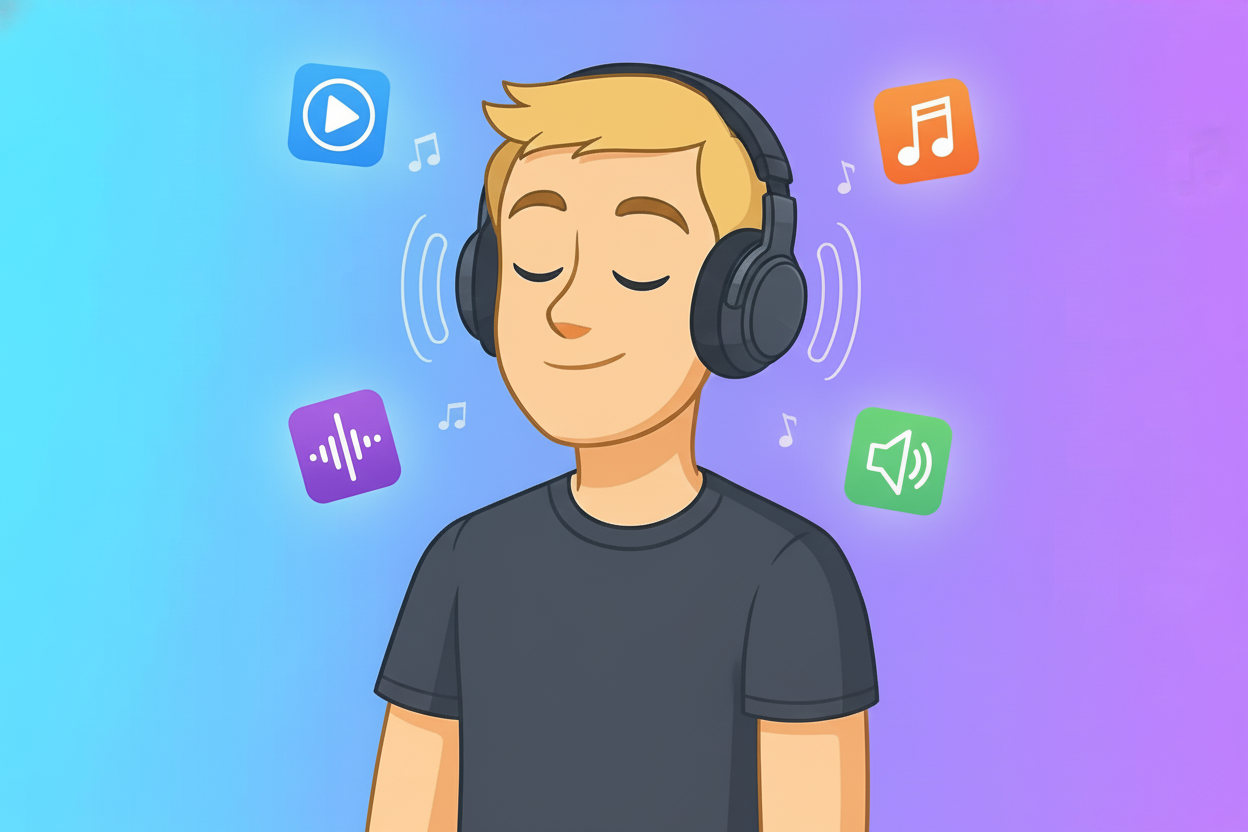You face dozens of music streaming choices, each offering millions of songs, but differences in sound quality, price, and features determine which platform suits your habits whether you commute daily, upgrade your home audio, or follow new artists through algorithm-powered playlists.
The global music streaming market reached $47.06 billion in 2025 and continues growing at 17.3 percent annually as listeners move from downloads to on-demand access.
Key Takeaways
- Audio quality ranges from 320 kbps standard to 24-bit/192 kHz hi-res lossless on Apple Music, Amazon, Tidal, and Qobuz.
- Amazon Music Unlimited costs $9.99 per month for Prime members, the lowest premium price.
- Tidal pays artists $0.012 to $0.013 per stream, three times Spotify’s rate.
- YouTube Music includes video content; Pandora excels at passive radio discovery.
- Free tiers from Spotify and YouTube Music offer ad-supported access without credit cards.
How We Compared These Services
We evaluated eight leading music streaming services based on audio quality tiers, library size, pricing structure, device compatibility, offline listening, and unique features like video content, social sharing, and exclusive releases.
Each service profile below includes verified subscriber numbers, pricing as of October 2025, supported platforms, and direct download links.
Testing focused on real-world scenarios: streaming over cellular and Wi-Fi, switching between devices, examining discovery algorithms, and comparing lossless playback on compatible headphones and speakers.
We prioritized transparency by citing manufacturer specifications and industry comparisons instead of marketing claims.
Best Music Streaming Services and Apps
1. Apple Music
Apple Music reached 112 million paid subscribers worldwide in 2024, making it the second-largest service globally and the most popular in the United States with 33 million users.
It offers lossless streaming up to 24-bit/192 kHz using ALAC (Apple Lossless Audio Codec) and spatial audio with Dolby Atmos on more than 100 million tracks at no extra charge beyond the $10.99 monthly individual plan.
The service integrates seamlessly across iPhone, iPad, Mac, Apple Watch, HomePod, CarPlay, Apple TV, and compatible third-party speakers using AirPlay 2.
Apple Music Classical is available as a separate app for orchestral works, operas, and chamber music, featuring specialized search and metadata.
Offline downloads allow up to 100,000 songs across ten devices, and family plans cover six people for $16.99 per month.
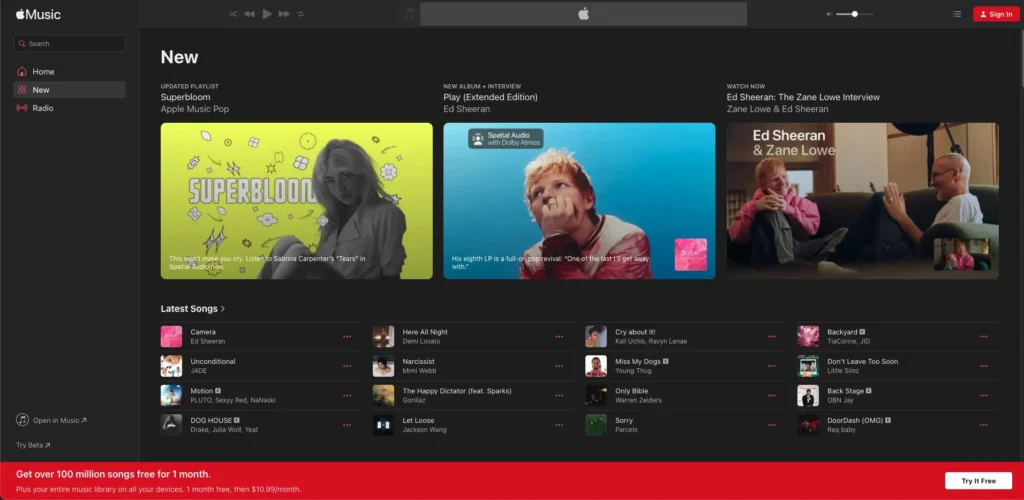
- Hi-res lossless up to 24-bit/192 kHz at no extra cost
- Spatial audio with Dolby Atmos included
- Apple Music Classical app for specialized genres
- Seamless integration across the Apple ecosystem
- High artist payouts of $0.01 per stream
- Interface is less intuitive on non-Apple devices
- Discovery algorithm performs worse than Spotify’s
- No free tier available
- Requires Apple ID for all platforms
Pricing: $10.99 per month for individuals, $16.99 per month for families (six users), $5.99 per month for students, $109 per year for individuals
Audio quality: Lossless 16-bit/44.1 kHz (ALAC), high-resolution lossless 24-bit/192 kHz, spatial audio (Dolby Atmos)
Library: Over 100 million songs, more than 30,000 playlists
Free trial: 1 month (6 months with eligible device purchase)
2. Spotify
Spotify dominates global music streaming with 696 million monthly active users and 276 million Premium subscribers as of Q2 2025, holding roughly 30 percent market share.
It excels at personalized recommendations through algorithms like Discover Weekly, Release Radar, and the AI-powered DJ feature that curates tracks based on listening history and mood.
Premium subscribers stream at up to 320 kbps Ogg Vorbis quality with unlimited skips, offline downloads on five devices, and ad-free playback for $10.99 per month.
Social features include collaborative playlists, friend activity feeds, Spotify Wrapped annual summaries, and the ability to share tracks directly to Instagram Stories.
The platform offers over 7 million podcast titles alongside 100 million songs, and Spotify for Artists provides real-time analytics for musicians.
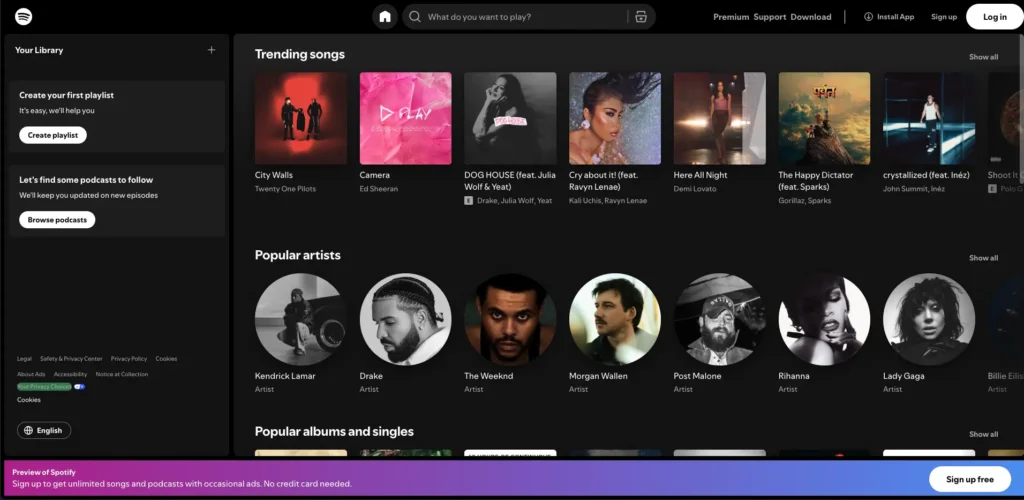
- Best-in-class personalized discovery algorithms
- Free tier with ad-supported listening
- Collaborative playlists and social sharing features
- Cross-platform compatibility (iOS, Android, Windows, macOS, Linux, game consoles)
- Largest global user base with 696 million users
- No lossless or hi-res audio tier
- Artist payouts are among the lowest at $0.003 to $0.004 per stream
- Free tier allows only shuffle play on mobile
- Ads interrupt listening on the free plan
Pricing: Free (ad-supported), $10.99/month Premium individual, $16.99/month family (six users), $5.99/month student
Audio quality: Up to 320 kbps Ogg Vorbis (Premium), 160 kbps (Free)
Library size: Over 100 million songs, more than 7 million podcasts
Free trial: 1 month Premium
3. Amazon Music Unlimited
Amazon Music Unlimited serves over 80 million users worldwide, with 52.5 million in the United States, holding 11.11 percent of the global streaming market.
Prime members access on-demand streaming for $9.99 monthly, the lowest premium tier cost among major services, while non-Prime subscribers pay $10.99.
Amazon Prime membership alone includes shuffle-only access to 100 million songs at no additional fee, though on-demand playback and hi-res audio require the Unlimited upgrade.
The service offers HD (850 kbps FLAC at 16-bit/44.1 kHz) and Ultra HD (3730 kbps FLAC at 24-bit/192 kHz) lossless streaming at no extra cost, along with spatial audio on supported tracks.
Integration with Alexa-enabled devices, Fire TV, Echo speakers, and third-party Alexa-compatible systems provides easy voice control and multi-room audio.
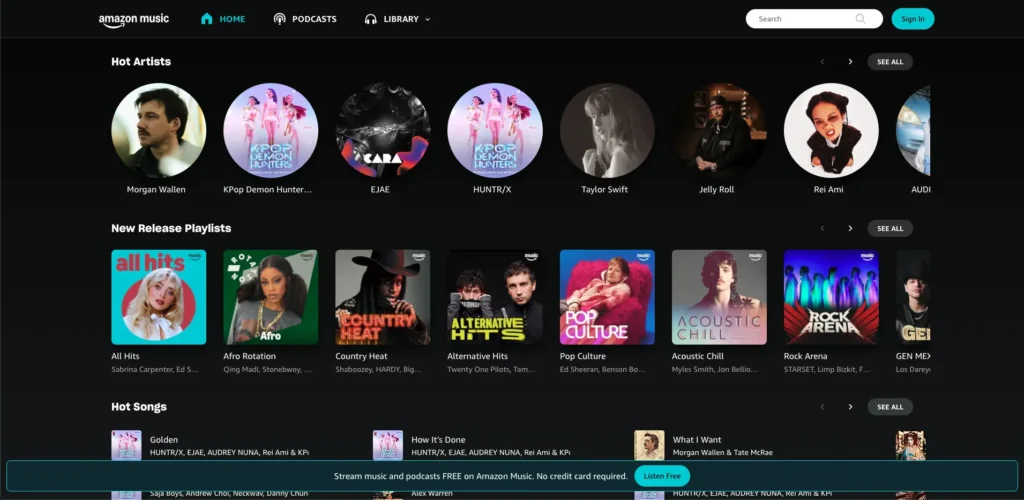
- Lowest premium price: $9.99/month for Prime members
- Hi-res audio up to 24-bit/192 kHz included
- Spatial audio at no extra cost
- Full Alexa and Echo device integration
- Prime members receive shuffle mode free
- Interface less polished than Spotify or Apple Music
- Discovery features fall behind competitors
- Prime shuffle-only mode frustrates on-demand listening
- Smaller exclusive content library
Pricing: $9.99/month (Prime members), $10.99/month (non-Prime), $16.99/month family plan (six users), Prime Music shuffle-only included with Prime
Audio quality: HD 850 kbps FLAC (16-bit/44.1 kHz), Ultra HD 3730 kbps FLAC (24-bit/192 kHz), spatial audio
Library: Over 100 million songs
Free trial: 30 days of unlimited access
4. YouTube Music
YouTube Music combines traditional audio streaming with official music videos, live performances, remixes, and user-generated content in a single interface, setting it apart from audio-only competitors.
The service reached 125 million subscribers combined with YouTube Premium by June 2025, offering ad-free video streaming, background playback, and offline downloads for $10.99 per month.
It streams audio at up to 256 kbps AAC quality and supports iOS, Android, smart TVs, Web Player, and Google Home devices.
YouTube Music’s recommendation engine draws from both official releases and YouTube’s extensive catalog of covers, rarities, concert footage, and DJ sets not available on traditional platforms.
Integration with YouTube’s broader ecosystem allows subscribers to remove ads from regular YouTube videos and access YouTube Originals.
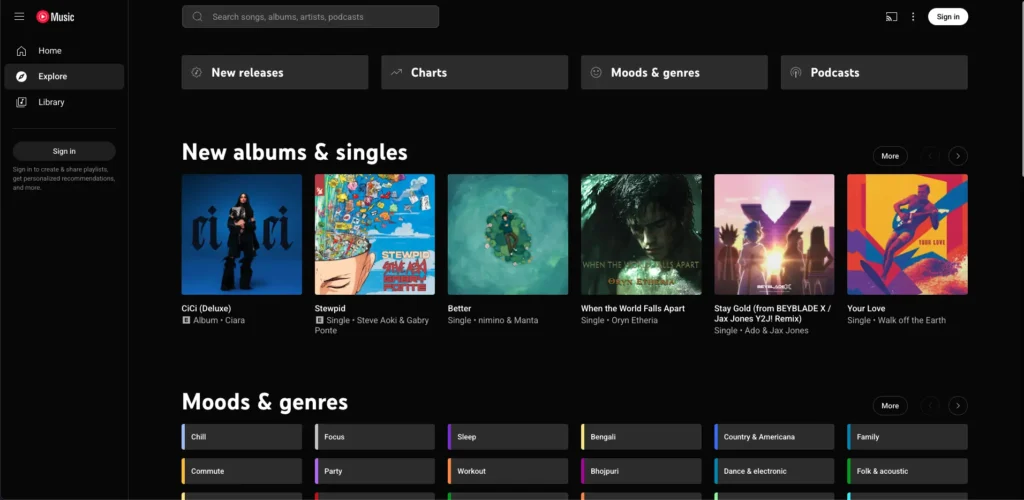
- Unique access to music videos, live performances, and covers
- Includes ad-free YouTube Premium at the same price
- Extensive catalog including user-generated content
- Effective recommendation engine based on YouTube history
- Works seamlessly with Google Home and Chromecast
- No lossless or high-resolution audio options
- Free tier requires screen-on playback (no background audio)
- Interface sometimes defaults to video when audio is preferred
- Audio quality maxes out at 256 kbps AAC
Pricing: Free (ad supported, limited features), $10.99/month individual (includes YouTube Premium), $16.99/month family (five users), $5.99/month student
Audio quality: Up to 256 kbps AAC
Library: Over 100 million official tracks plus user-generated content
Free trial: 1 month Premium
5. Tidal
Tidal offers audiophile-grade streaming with two subscription tiers: HiFi at $10.99 monthly for lossless FLAC (1411 kbps at 16-bit/44.1 kHz) and HiFi Plus at $19.99 monthly for hi-res MQA up to 9216 kbps.
The service pays artists $0.012–$0.013 per stream, the highest payout rate among major platforms about three times Spotify’s average and double Apple Music’s rate.
This artist-first philosophy attracts musicians and fans who prioritize fair compensation, although Tidal’s global subscriber base remains smaller at approximately 5 million users.
Tidal Connect allows direct streaming to compatible network players, DACs, and active speakers without using a phone, reducing latency and improving sound quality on high-end systems.
The platform offers exclusive content such as early releases, behind-the-scenes videos, and artist interviews, along with integration with Roon for multi-room audiophile setups.
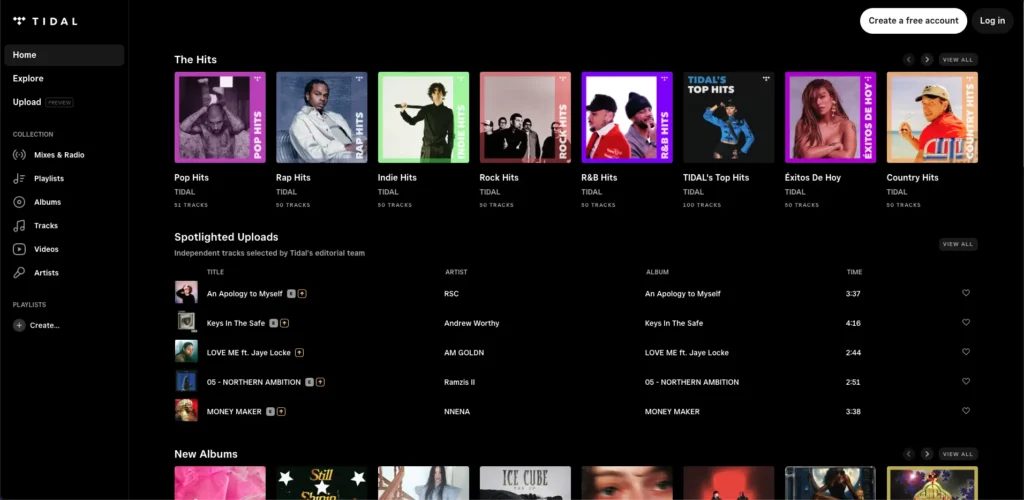
- Highest artist payouts of $0.012 to $0.013 per stream
- Hi-res MQA up to 9216 kbps on HiFi Plus
- Tidal Connect for direct device streaming
- Exclusive content and early releases
- Roon integration for audiophile multi-room setups
- HiFi Plus costs $19.99 per month, the highest among competitors.
- Smaller catalog occasionally delays new releases.
- Recommendation algorithm is weaker than Spotify’s.
- User base is smaller, with approximately 5 million globally.
Pricing: $10.99 per month for HiFi (lossless), $19.99 per month for HiFi Plus (hi-res MQA), $16.99 per month for family plan (six users)
Audio quality: HiFi 1411 kbps FLAC (16-bit/44.1 kHz), HiFi Plus MQA up to 9216 kbps, spatial audio
Library: Over 100 million songs, exclusive releases
Free trial: 30 days
6. Deezer
Deezer operates in more than 180 countries with strong presence in Europe, Latin America, and emerging markets, offering localized content and regional pricing not available on U.S.-focused platforms.
Its Flow feature creates an endless personalized radio stream combining favorite tracks with algorithmic recommendations, updating continuously based on skips and likes.
Deezer HiFi delivers lossless FLAC streaming at 1411 kbps (16-bit/44.1 kHz) for $10.99 monthly, matching CD quality without higher-resolution tiers.
The service supports lyrics display, song identification, and podcast integration with 120 million tracks.
Device compatibility includes iOS, Android, Windows, macOS, Web Player, Sonos, smart speakers, and in-car systems.
While Deezer does not have the market dominance of Spotify or Apple Music in the United States, its international reach and competitive pricing make it a viable alternative for travelers and expatriates who want consistent service across regions.
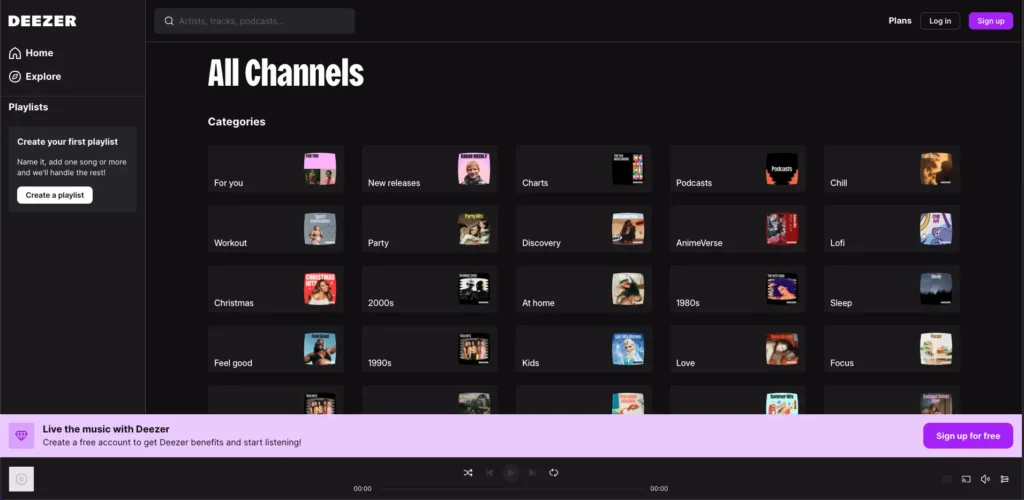
- Available in over 180 countries with localized content
- Flow feature for personalized endless radio
- Lossless FLAC at 1411 kbps for $10.99 per month
- Built-in lyrics and song identification
- Free tier with ad-supported shuffle play
- Limited U.S. market presence and awareness
- No high-resolution tier beyond 16-bit/44.1 kHz
- Discovery features are less refined than Spotify’s
- Smaller exclusive content library
Pricing: Free (ad supported), $10.99/month Premium, $10.99/month HiFi (lossless), $17.99/month family (six users)
Audio quality: Up to 320 kbps MP3 (Premium), 1411 kbps FLAC (HiFi)
Library: Over 120 million songs
Free trial: 30 days
7. Qobuz
Qobuz targets audiophiles and collectors with hi-res streaming up to 24-bit/192 kHz and the option to purchase lossless downloads for permanent offline ownership.
The Studio tier costs $12.99 per month for streaming access, while download purchases range from $10 to $25 per album depending on resolution.
Qobuz highlights editorial quality with expert-written liner notes, genre guides, and curated playlists for jazz, classical, and electronic music.
The platform’s smaller catalog, approximately 70 million tracks, focuses on master-quality recordings rather than comprehensive mainstream coverage and occasionally misses new pop releases.
Device support includes iOS, Android, Windows, macOS, Web Player, Roon, Sonos, and high-end network players from brands such as Naim, Linn, and Auralic.
Qobuz appeals to listeners who value archival quality and DRM-free downloads over algorithmic discovery, serving a niche but dedicated user base willing to pay premium prices for uncompromised audio accessory compatibility.
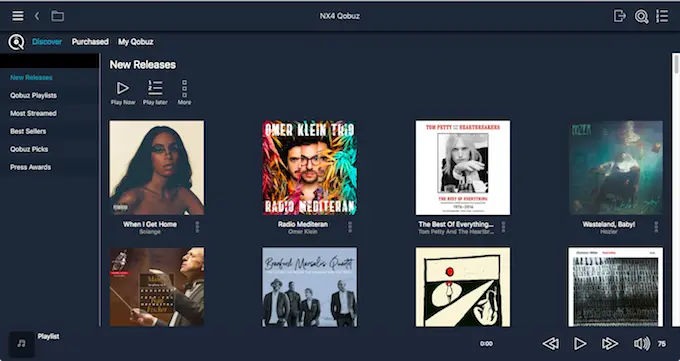
- Hi-res streaming up to 24-bit/192 kHz
- DRM-free lossless download purchases available
- Expert-written liner notes and editorial content
- Master-quality recordings for audiophiles
- Integration with Roon and high-end streamers
- Smaller catalog with 70 million tracks
- Higher price of $12.99/month for the Studio tier
- Sometimes missing new mainstream releases
- Limited recommendation and discovery features
Pricing: $12.99 per month for Studio (hi-res streaming); download purchases range from $10 to $25 per album
Audio quality: Up to 24-bit/192 kHz FLAC
Library: Over 70 million songs
Free trial: 30 days
8. Pandora
Pandora pioneered algorithm-driven radio with its Music Genome Project, analyzing hundreds of musical attributes to create personalized stations based on seed artists, tracks, or moods.
Unlike on-demand services, Pandora focuses on lean-back listening where listeners skip occasional tracks but let the algorithm curate the flow.
Pandora Plus costs $4.99 monthly for ad-free listening with unlimited skips and offline radio, while Pandora Premium at $10.99 offers full on-demand access similar to Spotify.
The free tier remains popular in the United States with ad-supported radio and limited skips, generating revenue through targeted audio and display ads.
Pandora integrates with iOS, Android, Web Player, smart speakers, and in-car systems, though its library of more than 40 million songs is smaller than those of larger competitors.
Pandora’s strength is passive listening for background music during work or commutes, appealing to users who prefer lo-fi music and familiar favorites instead of actively searching for tracks.
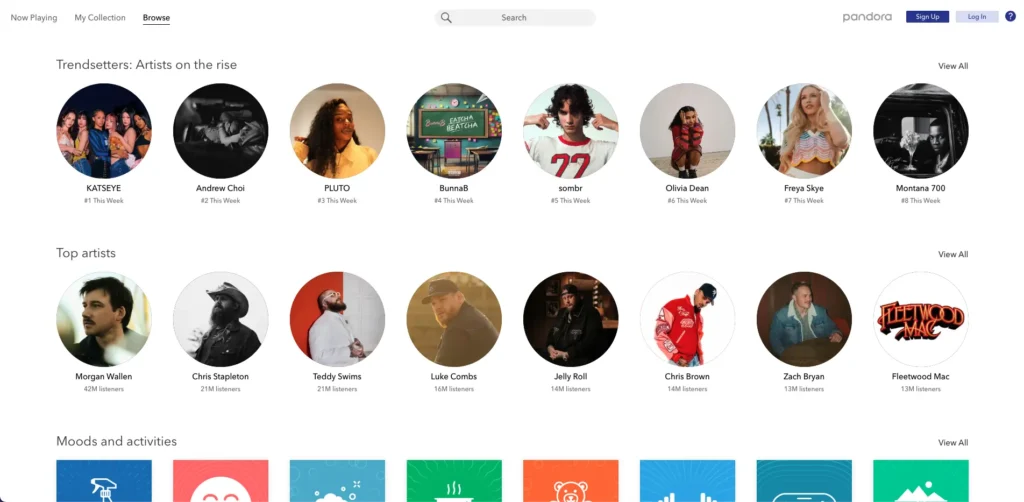
- Pandora Plus only $4.99/month for ad-free radio
- Music Genome Project analyzes 450 attributes per song
- Effective passive discovery for background listening
- Free tier widely used in the U.S.
- Unlimited skips on Plus and Premium tiers
- Smaller library with over 40 million songs
- Radio-focused model restricts on-demand control on Plus
- User base declining, having lost more than 10 million users in two years
- Available only in the U.S., Australia, and New Zealand
Pricing: Free (ad-supported), $4.99/month Plus (ad-free radio), $10.99/month Premium (on-demand)
Audio quality: Up to 192 kbps AAC
Library: Over 40 million songs
Free trial: 30 days for Plus or Premium
Audio Quality Tiers Explained
Audio quality tiers determine how much detail you hear from the original recording, ranging from compressed 256 to 320 kbps streams to lossless CD quality at 1411 kbps (16-bit/44.1 kHz) and hi-res formats up to 24-bit/192 kHz.
Lossless audio preserves the full frequency range and dynamic depth without compression artifacts, while standard Premium tiers use efficient codecs like AAC or Ogg Vorbis that sound excellent on most consumer equipment.
Most platforms deliver 320 kbps as their highest standard tier, which is sufficient for Bluetooth headphones and portable speakers.
Apple Music, Amazon Music Unlimited, Tidal, Qobuz, and Deezer offer lossless and hi-res options at no extra cost or for a small fee, appealing to listeners with wired headphone drivers and dedicated DACs.
Spatial audio using Dolby Atmos adds immersive surround effects on compatible tracks and is available through Apple Music and Amazon Music Unlimited.
Which is the best streaming service for music?
The best service depends on your priorities: Apple Music leads in hi-res lossless audio and spatial audio at $10.99 monthly, Spotify offers personalized recommendations and social features with a strong free tier.
Amazon Music Unlimited has the lowest cost at $9.99 for Prime members, YouTube Music includes video content, and Tidal pays artists the most per stream while delivering audiophile-grade MQA.
Budget-conscious listeners appreciate free tiers, while serious audio enthusiasts focus on bit depth and sample rates.
What you need:
- Compatible device (smartphone, computer, or dedicated streamer)
- Headphones, speakers, or smart audio system
- Stable internet connection (Wi-Fi or 4G/5G)
Steps to choose:
- Identify your priority: budget, audio quality, song selection, or device ecosystem.
- Test free trials from Apple Music, Spotify, Amazon, and Tidal.
- Compare sound quality using the same headphones or speakers.
- Check which service works with your smart home or car system.
Free vs Paid Tiers
Free tiers provide entry points with ad-supported listening, limited skips, and shuffle-only playback on mobile, while paid subscriptions remove ads, allow offline downloads, and enable on-demand track selection.
Spotify Free offers the most generous no-cost experience with desktop on-demand access and mobile shuffle, followed by YouTube Music’s ad-supported catalog with limited background playback.
Amazon Prime members receive shuffle-only access to 100 million songs without additional fees, bridging free and paid models.
Premium tiers typically cost $10.99 per month and include offline listening on multiple devices, higher bitrate streaming (320 kbps or lossless), and features such as lyrics, collaborative playlists, and priority customer support.
Family plans covering up to six users range from $16.99 to $17.99, while student discounts reduce individual plans to $5.99.
Hi-res and spatial audio are available at no extra charge on Apple Music and Amazon Music Unlimited but require the $19.99 tier on Tidal.
Which is the best music app for free?
Spotify Free offers the best no-cost experience with ad-supported access to over 100 million tracks, shuffle play on mobile, unlimited skips on desktop, and personalized playlists without needing a credit card.
YouTube Music and Amazon Music also have free tiers, but Spotify’s discovery algorithms and social features make it the top choice for budget-conscious listeners testing music apps without ads at the Premium level.
Which is the cheapest music streaming service?
Amazon Music Unlimited costs $9.99 monthly for Prime members, making it the least expensive full-featured premium service with on-demand playback, offline downloads, and hi-res audio.
Pandora Plus starts at $4.99 monthly for ad-free radio listening without on-demand access, while most standard premium tiers from Apple Music, Spotify, and YouTube Music cost $10.99.
Listeners who already pay for Prime save $12 annually compared to other platforms.
Is Amazon Music free for Prime members?
Amazon Music is included with Prime membership but limits listening to shuffle mode on a catalog of 100 million songs without offline downloads or on-demand selection.
For full on-demand playback, unlimited skips, offline listening, and hi-res audio up to 24-bit/192 kHz, Prime members pay an additional $9.99 monthly for Amazon Music Unlimited, totaling $19.98 when combined with the $14.99 Prime subscription.
Comparing wired and wireless headphones shows that lossless benefits require wired connections or high-quality Bluetooth codecs like aptX HD or LDAC, while standard 320 kbps streams sound excellent on most wireless devices.
Conclusion
The best music streaming service matches your listening priorities, device ecosystem, and budget constraints instead of focusing on subscriber counts.
Apple Music leads in hi-res lossless audio and seamless iOS integration. Spotify excels in discovery algorithms and social features, offering the strongest free tier.
Amazon Music Unlimited provides great value for Prime members at $9.99 monthly. YouTube Music combines audio and video content uniquely.
Tidal supports artists fairly while catering to audiophiles with MQA quality. Deezer, Qobuz, and Pandora serve specialized niches, ranging from international availability to download ownership.
Test free trials to compare audio quality using your existing smart audio devices before committing.
Visit SoundHub.io regularly for detailed headphone reviews, audio accessory comparisons, and streaming platform updates to improve your listening experience.
FAQs
1) What Are the Best Music Streaming Services?
The best music streaming services are Apple Music for hi-res audio and ecosystem integration, Spotify for its algorithms and social features, Amazon Music Unlimited for Prime members looking for value, YouTube Music for video content, and Tidal for audiophile-grade streams.
2) What Are the Most Popular Music Streaming Services?
The most popular music streaming services by subscriber count are Spotify with over 696 million users, Apple Music with approximately 112 million subscribers, Amazon Music with around 80 million users.
3) Which Music Streaming Service Has the Best Sound Quality?
Tidal and Qobuz provide the best sound quality with hi-res lossless streaming up to 24-bit/192 kHz and MQA formats reaching 9216 kbps. Apple Music and Amazon Music Unlimited also offer excellent hi-res lossless at 24-bit/192 kHz with spatial audio at no extra cost.
4) Can You Use Music Streaming Services Offline?
Yes, all premium music streaming services support offline listening by downloading songs, albums, or playlists to your device over Wi-Fi


